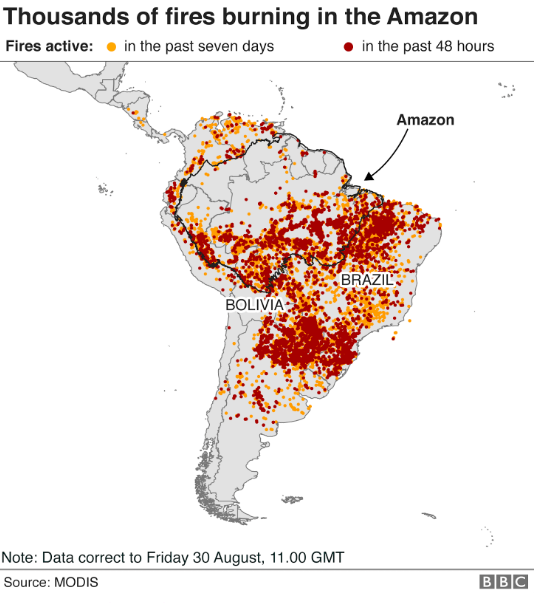By Mira Lerner || Contributing Writer
The flames of the Amazon are finally shedding mainstream light on the eurocentricity and white supremacy that pervade the wealthy 1%. In light of the record fires ripping through the Amazon rainforest and the burning of Notre Dame cathedral, many media outlets are highlighting the disturbingly different responses that these two situations have provoked around the world. A few French billionaires pledged hundreds of millions of dollars to aid in the restoration of Notre Dame, while the entire G7 managed to scrounge together $22 million for Brazil. This one highly publicized example of how the uber-wealthy decide to use their money has seemingly come as a shock and an affront to many people around the world. Questions such as, “If the ultra-rich can chuck in so many millions of euros for a building, then what stops them ending hunger and poverty” have been popping up around the internet and prompting outrage (Aditya Chakrabortty for the Guardian).
Why, though, is it so surprising that billionaires are more willing to give money to a building than to other humans in need? In many ways, the world’s wealthy are contributing to the causes of environmental disasters and human suffering every day in their pursuit of economic development and business decisions. Not only is the money pledged to Notre Dame not being donated to the Amazon or people in need, but it was arguably made off of their sacrifices. This one-time monumental investment is simply in the limelight.
Two of the 3 billionaires who pledged a total of 400 million pounds (James McAuley for the Washington Post) to Notre Dame are Francois Pinault and Bernard Arnault. Both men are CEOs of luxury international conglomerates, Artemis and LVMH, respectively. Patrick Pouyanne, the third billionaire, made his fortune at Total, one of the seven major oil companies in the world. All three donors are white. Especially in cases of large, international corporations, prosperity in a capitalist society is a result of extensive histories of colonization and exploitation of other nations and peoples. The deforestation of the Amazon rainforest for farmland to provide internationally demanded crops is just one example of an environment at the mercy of consumerism.
It is my hope that recent public outcry will prompt mainstream media to invest more time in reporting on the destructive histories and current systems that allow for such wealth in a concentrated group. There is plenty of opportunity for increased coverage on the ties between resource exploitation in the global south, economic development in the global north, climate change, and indigenous people affected by such phenomena. Additionally, investigating the social constructs that support these transactions may put pressure on the wealthy to donate to more publicly beneficial causes. Thus, next time some billionaires pledge to fix a building it won’t be such a surprise.
Senior Mira Lerner is a Contributing Writer, her email is mlerner@fandm.edu
